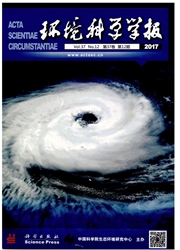

 中文摘要:
中文摘要:
通过测定超声辐射前后污泥性质的变化,不同处理方式对污泥活性影响以及自由基清除剂NaHCO3加入对超声作用效果影响,初步探讨了低强度超声波辐射对污泥生物活性的影响机制.研究结果表明,低强度超声辐射的机械作用和空化作用,使污泥絮体破碎,强化了固-液对氧的传质,提高了酶活性以及增加了溶液中可利用基质,从而强化了污泥的生物活性;不过,超声辐射同时也产生大量自由基,会对污泥生物活性产生抑制或破坏.因此,低强度超声辐射对污泥活性影响是促进效应和抑制效应共同作用的综合表现.
 英文摘要:
英文摘要:
The mechanism of biological activity enhancement of sludge by low intensity ultrasound was investigated based on the sludge characteristics before and after ultrasonic treatment, the impact of different ultrasonic treatment patterns, as well as the effect of addition of the radical scavenger NaHCO3. Test results indicate that due to the mechanical and cavitation effects of the low intensity ultrasound irradiation, the sludge floes disintegrated; the liquid-solid mass transfer of the system improved ; the activity of microbial enzymes was enhanced ; and the concentration of biodegradable substances in the mixture increased. On the other hand, a large number of free radicals were generated during ultrasonic cavitation, which could inhibit or even damage the biological activity of the cells. Therefore, the effect of low intensity ultrasound irradiation on the sludge activity is a complex combination of enhancement and inhibition.
 同期刊论文项目
同期刊论文项目
 同项目期刊论文
同项目期刊论文
 期刊信息
期刊信息
